Introduction
As parents, we always strive to provide the best for our children, particularly when it comes to their growth and learning. One popular approach that has stood the test of time is the Montessori method. Montessori toys are designed to help children learn through exploration, creativity, and independence. But why are Montessori toys so good for your child’s development?
In this article, we will explore what makes Montessori toys special, how they benefit children, and why they are worth considering for your little one. Let’s dive in!
What are Montessori toys?
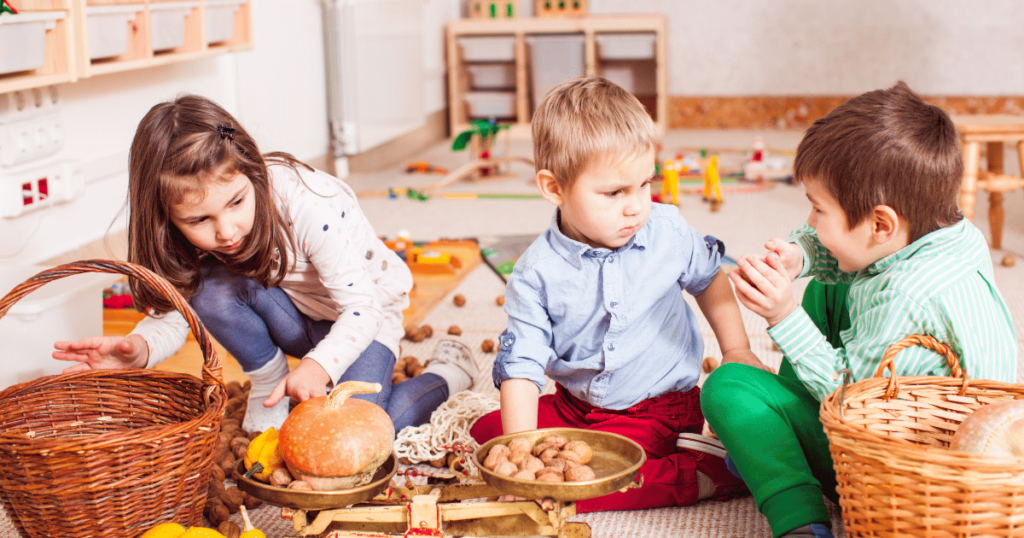
Montessori toys are more than just playthings; they serve as tools for learning. These toys are usually simple, made from natural materials, and encourage children to use their imagination. Unlike flashy, battery-operated toys, Montessori toys focus on helping kids develop important skills like concentration, coordination, and problem-solving.
Most Montessori toys:
- Are made from wood or natural materials
- Do not have bright, flashy colors or sounds
- Promote hands-on learning and exploration
What are the benefits of Montessori toys?
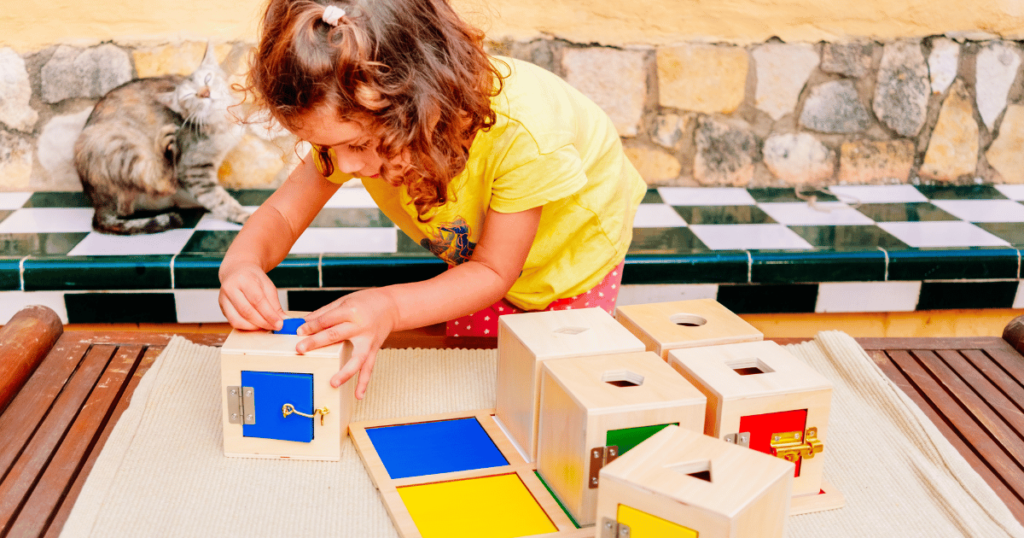
#1 Encourages Independent Learning
Independence is a fundamental principle of Montessori education. Montessori toys are designed to let children explore on their own. These toys often have open-ended designs, allowing kids to decide how they want to play. This helps them build confidence, think creatively, and make decisions by themselves.
For example, a set of wooden blocks encourages your child to create different shapes and structures, fostering both creativity and independence.
#2 Promotes Fine Motor Skills
Many Montessori toys focus on helping children develop their fine motor skills. This includes activities that involve grasping, pinching, or manipulating small objects. Toys like shape sorters, peg boards, or lacing toys require children to use their fingers in specific ways, improving their dexterity.
These skills are essential for daily activities like writing, drawing, and even buttoning a shirt later in life.
#3 Supports Concentration
Montessori toys are often designed to be calm and focused, unlike traditional toys that might overstimulate children with lights and sounds. Due to their simplicity, children can focus more effectively on the task at hand.
For instance, stacking rings or building towers with wooden blocks requires focus and patience, which helps children improve their attention span over time.
#4 Fosters Creativity and Imagination
Many Montessori toys are open-ended, meaning there is no right or wrong way to play with them. This freedom allows children to unleash their imagination and creativity. A simple set of wooden animals or a basket of natural objects like pine cones can turn into a whole world of imaginative play.
The ability to use toys in multiple ways helps children think outside the box and come up with new ideas, which is crucial for problem-solving and innovation.
#5 Teaches Real-Life Skills
Montessori toys are often designed to mimic real-life activities, such as cooking, cleaning, or gardening. These practical life toys help children develop essential life skills from a young age. For example, a toy kitchen set or a small broom allows children to practice tasks they see adults doing every day.
By learning how to use these tools, children feel more capable and connected to the world around them.
#6 Environmentally Friendly
Most Montessori toys are made from sustainable materials, such as wood, cotton, or metal, making them more eco-friendly than plastic toys. They are durable, meaning they can last for years and even be passed down to younger siblings.
If you’re conscious about the environment, Montessori toys are a great choice for reducing waste and promoting sustainability.
How Montessori toys help different stages of
development?
#1 Infants (0-12 months)
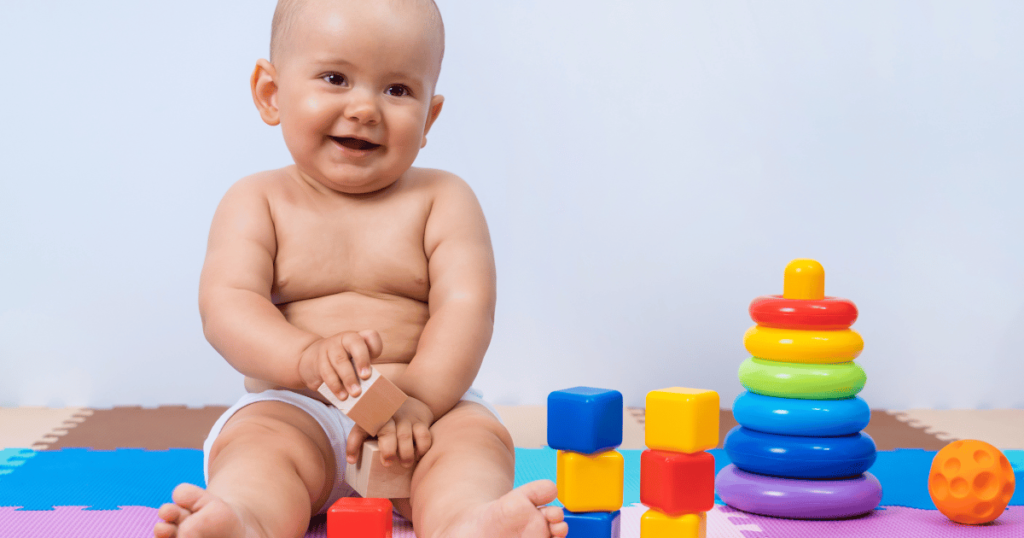
At this stage, babies are learning about the world through their senses. Montessori toys for infants include simple rattles, soft cloth toys, and natural grasping toys. These toys help babies develop their hand-eye coordination and sensory skills.
#2 Toddlers (1-3 years)
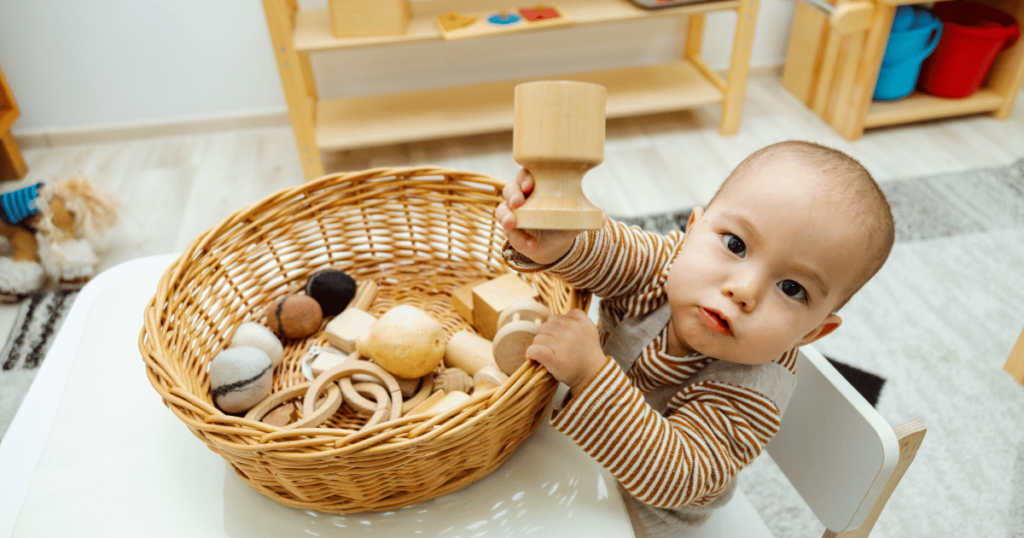
As toddlers become more mobile, they are ready for more complex toys that involve problem-solving and fine motor skills. Toys like stacking rings, shape sorters, and puzzles are perfect for this stage. These toys help toddlers practice spatial reasoning and hand-eye coordination.
#3 Preschoolers (3-5 years)
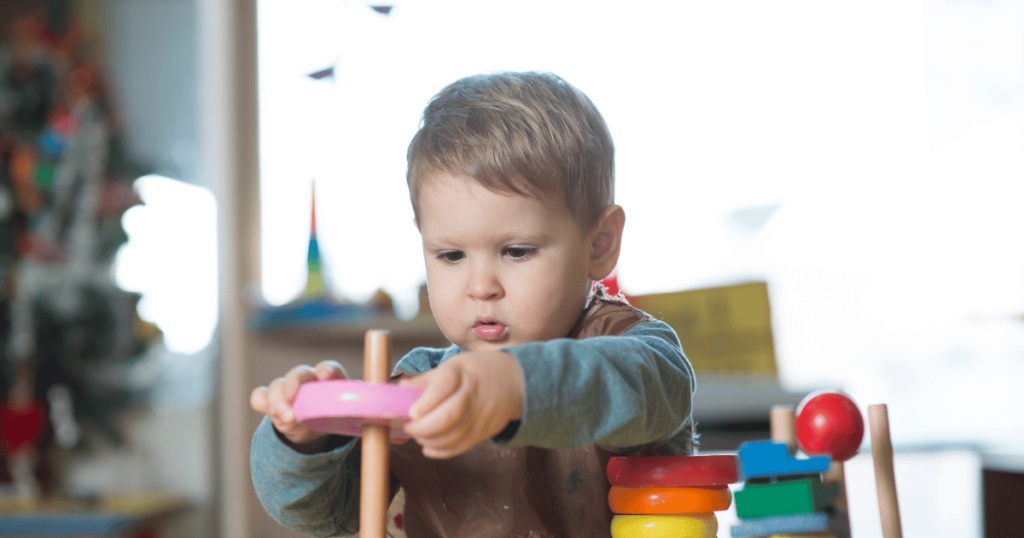
Preschoolers are becoming more independent and creative. Montessori toys for this age group often include building sets, pretend play items, and practical life tools. These toys encourage role play, creativity, and help children practice real-life skills.
How to choose Montessori toys?
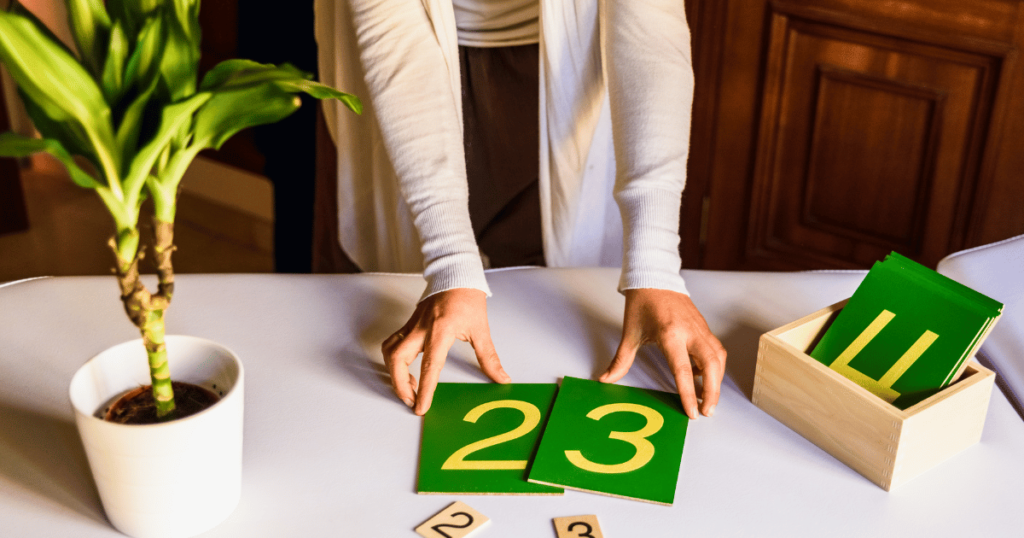
When selecting Montessori toys for your child, keep the following tips in mind:
- Look for natural materials like wood, cotton, or wool. These materials are both safe and durable.
- Choose toys that encourage independent play. Open-ended toys like building blocks or pretend play items give your child the freedom to explore and create.
- Avoid battery-operated or flashy toys. Stick to simple designs that promote concentration and hands-on learning.
For more guidance on choosing the right Montessori toys, visit this detailed guide on Montessori toys or check out this resource for some recommended options.
Common Questions About Montessori Toys
Are Montessori toys good for babies?
Yes! Montessori toys for babies focus on sensory exploration and motor skill development. Rattles, soft cloth books, and simple wooden grasping toys are great for infants.
Do Montessori toys help with learning?
Absolutely. Montessori toys are designed to teach specific skills, from math and science to language and problem-solving. They help children learn at their own pace through hands-on activities.
Why are Montessori toys so simple?
Montessori toys are purposefully simple to avoid overwhelming children with too much stimulation. The idea is to focus on one activity at a time, helping children concentrate better and learn more deeply.
For parents who have sent their children to a Montessori school from preschool through 12th grade, what do you think have been the advantages or disadvantages?
Advantages include fostering independence, self-discipline, and a love for learning. Montessori’s child-centered approach allows students to learn at their own pace. Disadvantages could be limited exposure to competitive environments or structured testing, which may be an adjustment when transitioning to traditional schools or higher education.
Early Childhood Education: What are the pros and cons of a Reggio Emilia-inspired preschool and a Montessori approach?
Montessori emphasizes independence, self-paced learning, and a structured environment with specific materials. Reggio Emilia focuses on creativity, collaboration, and a flexible curriculum based on children’s interests. The con of Montessori may be less emphasis on social collaboration, while Reggio’s downside could be less structured learning in core academic areas.
What are some durable Montessori wooden toys for children?
Durable Montessori wooden toys include stacking blocks, wooden puzzles, shape sorters, bead mazes, and wooden alphabet blocks. Brands like Melissa & Doug, Haba, and Grimm’s are known for quality, long-lasting wooden toys.
How do Montessori wooden toys support early childhood development?
Montessori wooden toys are simple, allowing children to focus on learning concepts like motor skills, problem-solving, and hand-eye coordination. They encourage sensory exploration, promote independent learning, and support fine motor skills without overwhelming distractions.
What are the key principles of Montessori education, and how do they benefit children’s development in early education settings like Magic Kids Montessori Preschool and Daycare?
Key principles of Montessori include independence, self-directed learning, hands-on engagement, respect for a child’s pace, and a prepared environment. These principles promote cognitive development, critical thinking, social skills, and emotional growth by giving children the freedom to explore and learn naturally.
Why are wooden toys preferred in Montessori education?
Wooden toys are preferred in Montessori education because they are natural, durable, and simple, encouraging sensory exploration without the overstimulation of flashy colors or sounds. They are environmentally friendly and promote focus, imagination, and hands-on learning.
What makes Montessori toys different from regular toys?
Montessori toys are designed to encourage independent learning, focus on real-life skills, and engage a child’s natural curiosity with simple, purposeful designs.
How do Montessori toys promote child development?
Montessori toys promote cognitive development, fine motor skills, problem-solving, and creativity by encouraging hands-on learning and exploration through open-ended play.
Why are wooden toys often used in Montessori education?
Wooden toys are durable, tactile, and environmentally friendly. Their simplicity aligns with Montessori principles, fostering sensory experiences and imaginative play without overstimulation.
Are Montessori toys better for learning?
Montessori toys focus on developing real-world skills, concentration, and self-confidence, making them highly effective for early learning compared to more passive, battery-operated toys.
Can Montessori toys help with independent play?
Yes, Montessori toys encourage independent play by allowing children to explore, manipulate, and solve challenges at their own pace, promoting autonomy and self-directed learning.
Other Reference
- American Academy of Pediatrics (AAP)
- BabyCenter
- What to Expect
- Healthy Children
- Verywell Family
- Parents
- Montessori ‘n’ Such
- The Montessori Notebook
- NAEYC
- Consumer Product Safety Commission (CPSC)
- The Spruce
Final Thoughts On Montessori Toys
Montessori toys are much more than just playthings. They serve as tools that help your child grow, develop, and learn essential life skills. By encouraging independent play, problem-solving, and creativity, Montessori toys set a solid foundation for lifelong learning.
These toys are eco-friendly, durable, and designed with your child’s development in mind. Whether your child is a baby, toddler, or preschooler, Montessori toys can support their growth in a natural and enriching way. So, the next time you’re shopping for toys, consider choosing Montessori for a more meaningful play experience
By investing in Montessori toys, you’re giving your child the tools they need for a brighter, more confident future!
Other References
- American Academy of Pediatrics (AAP)
- BabyCenter
- What to Expect
- Healthy Children
- Verywell Family
- Parents
- Montessori ‘n’ Such
- The Montessori Notebook
- NAEYC
- Consumer Product Safety Commission (CPSC)
- The Spruce
More to Read
- How to bathe a newborn baby in 13 steps: The comprehensive guide
- Getting the temperature just Right: A guide to baby bath water
- Bath Time: How often should you wash your little one
- Baby Bathtubs: The Best 5 Ways to Store Baby Bathtubs in 2024
- 4 Steps to Choose a Collapsible Baby Bathtub in 2024
- The Best 5 Baby Bathtubs for Small Space in 2024
- The Best 5 Inflatable Baby Bathtubs In 2024

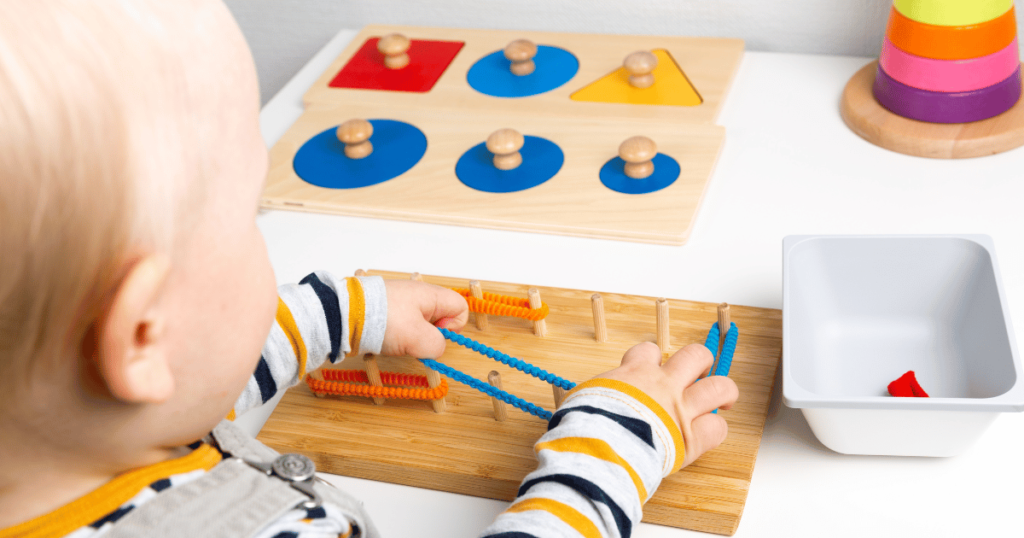
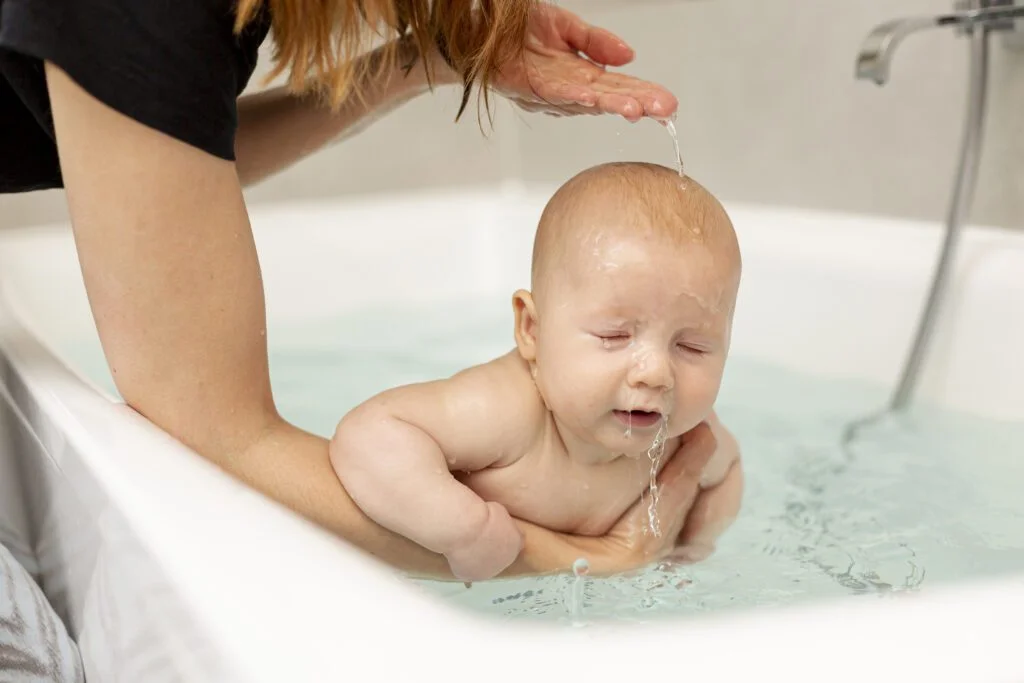

Spot on with this write-up, I truly feel this site needs a lot more attention. I’ll
probably be returning to read through more, thanks for the advice!!